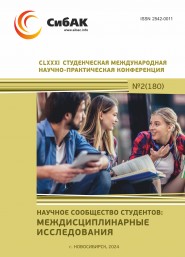Статья опубликована в рамках: CLXXXI Международной научно-практической конференции «Научное сообщество студентов: МЕЖДИСЦИПЛИНАРНЫЕ ИССЛЕДОВАНИЯ» (Россия, г. Новосибирск, 29 января 2024 г.)
Наука: Филология
Секция: Литературоведение
Скачать книгу(-и): Сборник статей конференции
дипломов
HISTORICAL AND POLITICAL CONDITION IN THE NOVEL “BYGONE DAYS”
ИСТОРИКО-ПОЛИТИЧЕСКАЯ ОБСТАНОВКА В РОМАНЕ “МЫШЛЕННЫЕ ДНИ”
Сайфуллоева Максуда
студент, Бухарский государственный университет,
Узбекистан, г. Бухара
Сафарова Зилола Толибовна
научный руководитель, доц., Бухарский государственный университет,
Узбекистан, г. Бухара
ABSTRACT
This research paper discusses the novel “Bygone Days”, which was written by famous Uzbek novelist Abdulla Qodiriy. It analyses the depiction of traditions and political and cultural peculiarities that existed in the late 19th century through the life of characters and main events.
АННОТАЦИЯ
В данной исследовательской статье рассматривается роман “Минувшие дни”, написанный известным узбекским писателем Абдуллой Кадырием. Анализируется изображение традиций и политических и культурных особенностей, существовавших в конце XIX века, через жизнь героев и основные события.
Keywords: novel, realism, social life, character, theme, political life.
Ключевые слова: роман, реализм, общественная жизнь, персонаж, тема, политическая жизнь.
Introduction. By reading the beginning chapters of the novel, it can be supposed that this work is a romantic novel. However, after further reading, the audience will understand that this novel mainly includes the theme of society, the theme of illiteracy. This book shows moral and cultural shortages in society and government in the period of the late 19th century through the love of Otabek and Kumush. Also, through the flow of events, the reader will meet the lifestyle of Uzbek people in the late 19th century: how their home was decorated, what kind of meals they had during special occasions, and their traditions during the wedding party. Because the events were especially based on real life and some of the characters are not fictional. It can be proved by the writer’s own words: “It’s clear, we took a step for new age we should follow this new age’s novelties anyway and also, we feel the responsibility to create new works, novels and narrations. …….. They say: “It is better to make an arrangement keeping in mind the history”. That’s why I began the matter from the history, from our recent past, darkest and fifty histories after the “Khans age”. Abdulla Qodiriy (Julqunboy)” [1, p. 1091].
During the flow of events, Qodiriy accurately shows the political condition of the Khanate of Kokand and its authority. For instance, during the novel, there is a strong conflict between two nations. It can be realized by this piece from the novel: “Bu kun Kirovchidan besh ming sipoh ila Normuhammad qushbegini Toshkand ustiga buyurilg’anlig’ini eshitdik. Fuqaroning tag’in qandog’ ko’rguliklari bor ekan, o’g’lim” [2].
This novel gives information about Uzbek history’s dirtiest days. The book shows spiritual darkness existing in the attitudes of the leading class, negative features of government and its structure. Authorities were so apathetic towards population, they were so keen on wealth and esteem, that is why they did not realize the risk of attack by Russian Empire. Furthermore, government implemented too many taxes that, it caused great refusal among people towards government. Another problem is that, regions were not close to each other and they had conflicts which caused political separation. Because of this they did not unite their force and they did not fight together towards unique enemy. The words of Yusufbek hoji can express how social-political conditions were difficult for common people: “Ana, o’g’lim, bizning xalqning holiga yig’lashni ham bilmaysan, kulishni ham!” [3, p. 367].
One of the American specialist Mark Reese says that: “I think Bygone days is well known primarily among the intelligentsia. Everyone knows the novel – just as, maybe, most American children know Mark Twain’s Huckleberry Finn. It is taught in schools throughout Uzbekistan, but it really takes a specialist to capture the aspects of the novel that go deeper than the romantic love between Otabek and Kumush.”
The writer vividly depicts the devastated political condition through the speeches of characters. Otabek recollects his travel to Shamai and says that: “Men o’risning idora ishlarini ko’rib, o’z idoramizning xuddi bir o’yinchoq bo’lg’anlig’ini iqror etishka majbur bo’ldim… Bizning idoramiz bu kungi tartibsizligi bilan ketabersa holimizning nima bo’lishig’a aqlim yetmay qoldi”. By these words of the hero, the writer depicts differences between government and political condition of the Khanate with developed Russian Empire.
Conclusion. It can be easily said that people can learn too many things from this novel. Also, it should be mentioned that this novel is the first novel in Uzbek literature and is astonishingly accepted by people. Qodiriy made an important warning to the young generation through his novel. This warning is always thinking benefits of our motherland and our relatives. Also, he showed people how to love, how to be loyal and reliable, and how to respect elderly people. Abdulla Qodiriy showed the beauty of the Uzbek language in “Bygone Days”. The words used in the speech of the characters, the descriptions of the places and events, and the style of the writer – all give evidence about the real historical and political life of the period illustrated in the work.
References:
- Chorieva M.J. “Abdulla Qodiriy’s novel “The Days Gone by” and the issue of translation”. ACADEMIC RESEARCH IN EDUCATIONAL SCIENCES VOLUME 2 | ISSUE 2 | 2021 ISSN: 2181-1385 Scientific Journal Impact Factor (SJIF) 2021: 5.723 DOI: 10.24411/2181-1385-2021-00305, p;1091
- Chorieva M.J. “Abdulla Qodiriy’s novel “The Days gone by” and the issue of translation” academic research in educational sciences volume 2 | issue 2 | 2021 ISSN: 2181-1385 Scientific Journal Impact Factor (SJIF) 2021: 5.723 DOI: 10.24411/2181-1385-2021-00305
- Abdulla Qodiriy “O’tkan kunlar”. – Toshkent: “Yangi nashr”, 2019. – 367b.
дипломов


Оставить комментарий